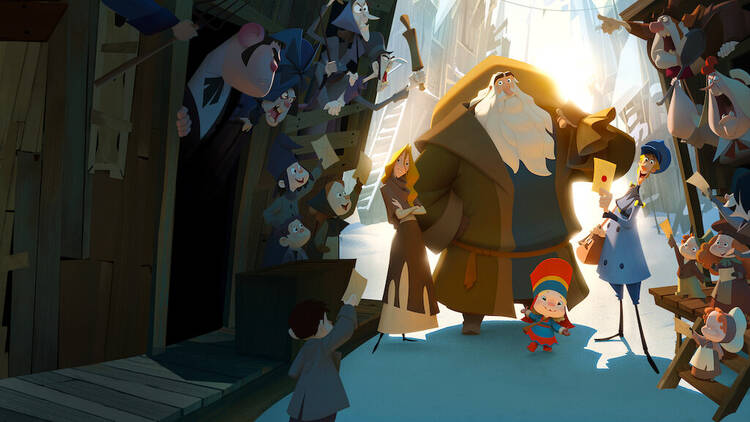The Catholic Movie Club is a short weekly essay pulling out spiritual themes in our favorite films. You can discuss the movies with other readers in the comments on this page or in our Facebook group. Find past Catholic Movie Club selections here.
For the month of December, Catholic Movie Club will cover more recent – and less well-known – Christmas films, to give you some new additions to your holiday canon.
Behind every tradition is a story. In his memoir The Book of Cain: On Adding a New Book to the Family Bible, the great Jesuit writer Bill Cain says: “And remember that the Bible as we have it is a second draft. Before it was written in words, it was written in meals and journeys, in births and deaths.” Before there were leatherbound lectionaries and liturgical cycles, there were stories passed along in whisper and song, over bread and in lessons to children. The listeners remembered those stories, and passed them along in turn.
That very passing-along becomes part of the story, and traditions arise to remind us that the story is still happening, that we play a role in it. As new generations hear the story they ask questions—a way of immersing themselves more deeply, entangling themselves further with the narrative.
That’s why, I think, kids ask so many questions about Santa Claus. “Why does he deliver toys?”, “How does he get into houses without chimneys?”, “How do the reindeer fly?” and so on. It’s not just curiosity, I believe, but a desire to locate themselves within the story, to figure out how they can participate. The Santa Claus tradition is about a relationship, after all: gift-giver and receiver, the one who performs good acts and the one who rewards them. It’s natural to want to know something about the person on the other side of that equation.
Hollywood has been happy to supply answers in films like “Santa Claus in Comin’ to Town” (1970), “The Santa Clause” (1994) and “Arthur Christmas” (2011) which explain everything from the red suit to the jolly laugh. The answers are mostly “magic” and “extremely advanced technology.” But the most recent entry in this subgenre takes a (relatively) more grounded approach. In “Klaus” (2019)—directed by veteran animator Sergio Pablos and written by Pablos, Jim Mahoney and Zach Lewis—the Santa legend grows from a simple act of kindness, and the transformative power it has on a community. It’s not magic reindeer feed or rocket-powered sleighs that keep the story alive, but the people who choose to become a part of it and make it their own.
The first of those people is Jesper (Jason Schwartzman), and his motives—at least at the start—are far from selfless. The pampered son of the Royal Postmaster General in 19th-century Norway, Jesper’s father exiles him to Smeerensburg, a frozen island village at the very top of the map, to teach him responsibility. It’s his last chance: Jesper needs to establish a working post office in Smeerensburg, or he’ll be cut off.
Unfortunately, Smeerensburg is the site of a centuries-old feud between the Krum and Ellingboe families, and the only messages they send are with bare knuckles and explosives. But a chance encounter with a reclusive toymaker, Klaus (JK Simmons), provides an unorthodox solution. Klaus press-gangs Jesper into helping him deliver a toy to a lonely child, which inspires the rest of the town’s children to write Klaus letters asking for gifts as well. At first Jesper encourages this as means to an end: mailing enough letters to satisfy his father. But Klaus’ generosity sends ripples through Smeerensburg, healing old wounds and inspiring a new spirit of fellowship. Jesper begins to realize that they’ve started something much bigger than a toy delivery service. As Klaus says: “A true selfless act always sparks another.”
What makes “Klaus” so charming is that it removes (most of) the literal magic from the Santa story, and replaces it with something even more extraordinary: the transformation of a community. Sworn enemies become friends, cynics—like jaded schoolteacher Alva (Rashida Jones)—learn to believe again. In the end, what makes Klaus and Jesper’s inaugural Christmas Eve trip possible is the power of people putting aside centuries of hatred and joining together to make their cold corner of the world a better, more loving place.
Of course, the traditional signifiers of Santa Claus accrue around Klaus as the story goes on: the reindeer, the chimneys, the red suit. Each of these has a mundane and often humorous explanation. What makes them magical is how children retell the story through a lens of innocence, wonder and pure belief. The literal truth of those stories is less important than what they mean and the spirit of generosity they inspire.
As we turn to our own traditions during Advent and Christmas, let’s not just go through the motions but remember why they matter. Our traditions sprang from concrete acts of love by God and our ancestors; honoring them is how we keep that love alive, and let it echo into the present. The story is still going on, and we all have a role to play.
“Klaus” is streaming on Netflix.








